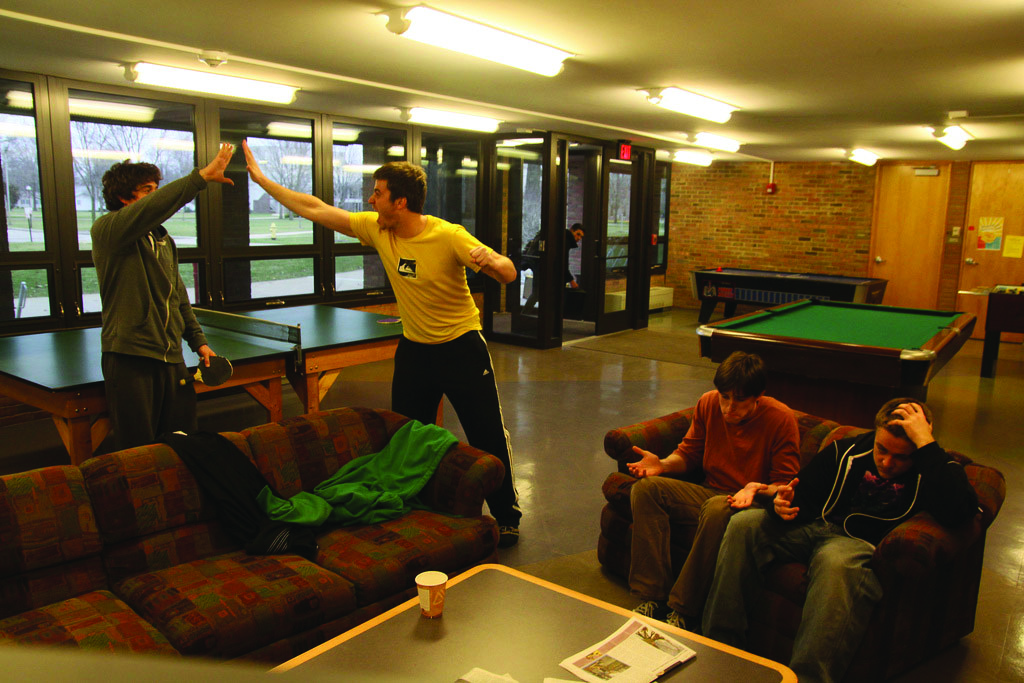It’s March Madness for the National Collegiate Athletic Association (NCAA), and this year’s annual March Madness tournament has held some rather large, and sometimes bitter, surprises.
For those of you who don’t know about the NCAA tournament, this is for you.
The bracket system is simple: win or go home. It’s a single elimination system. There are 68 teams this year; teams who have done the best in the regular season play the worst teams right away. This advantage clearly favors the better teams, but also is a recipe for some surprises, such as having a number eleven seed in the elite eight. A seed is tournament lingo for a team’s rank. The top teams are the top seeds, and the not-so-talented teams are the lower seeds.
Goshen College, as an NAIA school, does not participate in the madness, but that doesn’t mean that GC students and staff, along with people from all over the nation, aren’t going mad for love of the game. Watching anywhere from one to five games per day throughout the season, being a serious fan of March Madness basketball is like picking up a few extra courses.
Daniel Penner, a junior from Harper, Kan., began watching the NCAA tournament when he was a kid. Every year, he and his dad would go to the doughnut shop and join a bracket pool. He and his dad would fill out separate bracket pools. He’d pore over the bracket, looking at match ups and reading the paper. As he got older, he started using the Internet. Penner said he loved “competing against the old guys who’d make these brackets.” But it was also really good bonding time with his dad.
Penner said of NCAA “the first weekend is always a lot of excitement. But disappointment comes as my team loses and my bracket fails. This year is another example of that. My bracket failed this year because I had a few of the number one seeds matching up against the other top teams, but there were a lot of upsets this year. VCU, an eleventh seed and Butler, an eighth seed are still in the game.”
NCAA is a tradition for many people. Dustin George-Miller, coordinator for the Music Center office, has been running a NCAA pool for 14 years. It started during his undergraduate years as a student at Goshen, simply because he and his friends were interested. But his love of March Madness has kept him running the pool for years. This year, he has 75 brackets, four of which are contending for the finals. People’s brackets vary, and two of the four remaining brackets were side brackets or kid’s brackets.
“One of the brackets is based on mascots whose names are associated with cats, the other is a three-year-old’s,” said George-Miller.
Jeremy Pope, a senior from Columbus, Ohio, is an avid Ohio State fan. Ohio State, the number one seed overall, was upset by Kentucky (the number three seed). He is now rooting for Virginia Commonwealth University, originally the eleventh seed, but now touted by many fans as one of the best teams left in the tournament. Pope refered to VCU as his “Cinderella team.” Pope has been watching 3-5 games per day–more games than most people eat meals.
Kyle Capps, a freshman from Mount Clemens, Mich., is also a dedicated fan. For him, NCAA basketball is associated with a childhood dream of playing Division I basketball for his favorite team, Michigan State. Capps still loves the madness, and roots for Michigan State. His bracket had Kansas winning it all, but number one Kansas lost to eleventh-seed VCU. His bracket is ruined, but, like Pope, he’s rooting for VCU.
To those who don’t watch the tournament and are wondering what makes it so different from regular season basketball, each of person said something similar.
Penner said, “There are so many teams that have hope in the beginning, and there’s so many opportunities. It’s like America to an extent, it’s very nationalistic, that idea that anyone can make it. There’s this underdog ideology because on any given day an Arizona can beat a Duke or a VCU can beat a Kansas, and there is this idea of chance for all. Then, you add a catchy name like March Madness, I mean that’s exciting in itself, but it’s also the fact that if you lose you don’t play again. There’s an urgency.”
Capps said “It’s like reliving childhood dreams and staying in touch with them. You see how other players are playing the game and it pushes you to play better, too.”
George-Miller said, “It’s single elimination, neutral courts, anything can happen like an eighth and eleventh seed in the tournament. It’s high energy and hard playing.”
The madness is almost over, with the Final Four beginning on April 2 in Houston for men’s basketball and April 3 for women’s basketball in Indianapolis.



